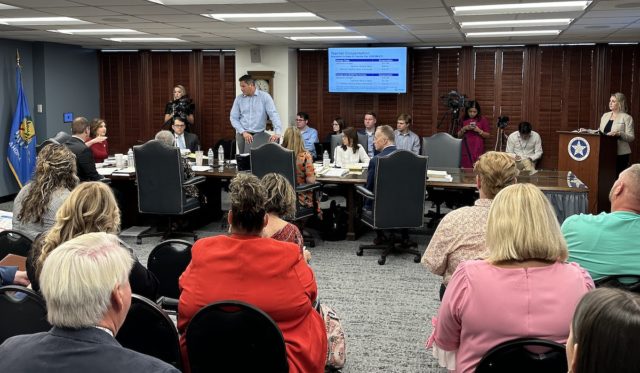

In a lighthearted meeting today that included board members joking extensively with one another, the Oklahoma State Board of Education approved a legislative budget request for Fiscal Year 2024 that proposes a $5,000 teacher pay raise.
State Superintendent of Public Instruction Joy Hofmeister, who chairs the board and is running for governor as a Democrat, announced a similar proposal as part of her campaign platform Monday.
“(A) teacher pay increase is very important because it’s about our kids,” Hofmeister told media after Thursday’s meeting. “We have to invest in people so that our children have what they need in order to learn and to be able to then grow our economy. So this is about an educated, healthy workforce, and it starts with education and teachers.”
The State Board of Education approves a budget request every fall as an official message to the Oklahoma Legislature, which convenes for regular session on the first Monday of every February. The board typically requests increased funding, and in recent years Gov. Mary Fallin and Gov. Kevin Stitt have also typically called for improving teacher pay during their State of the State addresses. (Lawmakers did not pass a teacher pay plan during the 2022 session, but they did create a teacher incentive program with bonuses for new educators.)
Thursday’s request from the State Board of Education proposed a total increase of more than $375 million, with the $5,000 across-the-board teacher pay raise proposal making up more than $309 million of that figure. This year, the Legislature increased the common education budget by about $17 million, although the teacher incentive program was appropriated through the State Regents for Higher Education.
If the Legislature agrees to increase teacher pay in the spring, it would be the first statewide pay raise for Oklahoma educators since 2018 and 2019. Prior to that, the Legislature had not mandated teacher raises for a decade. (The state board is required by law to submit a budget request for the next year by Oct. 1 annually.)
Last year, Stitt advocated for higher teacher pay through a merit-based system that he said would provide some teachers with “six-figure salaries,” but his initial proposal lacked policy details. The Legislature ultimately passed and Stitt signed a bill allowing excess lottery revenue to be used as a state match for school districts that create and offer pay bonuses for advanced teacher certifications.
Only one person, Tulsa Public Schools Board of Education President Stacey Woolley, spoke during public comments at Thursday’s meeting, and she used her time to advocate for the pay raise.
“The gross underfunding of public education in Oklahoma over the last several years has resulted in teachers and support staff who rely on their unions to provide them with food pantries, supply drives and contacts for local organizations who help fill the gaps in their finances when a tank of gas simply isn’t attainable,” Woolley told board members.
Hofmeister, whose term ends this year, will no longer be state superintendent when the budget request goes to the Legislature in January, but she said she feels confident lawmakers will approve the pay raise, particularly if defeats Stitt and becomes governor.
“I know that the Legislature wants to see high outcomes for students,” Hofmeister said. “And, certainly, the Legislature understands that we have to make a priority with kids and their education and that means ensuring we’ve got people and that investment in the workforce.”
State Secretary of Education Ryan Walters, who was appointed by Stitt, is running to replace Hofmeister and won the Republican nomination in August. Democrat and former teacher of the year Jena Nelson is running against him.
During his campaign, Walters has been openly critical of Hofmeister, and she appeared to take shots at him after the meeting for comments he made suggesting the state should get federal money out of education.
“I’ve heard of late someone saying that they would do away with those federal dollars,” Hofmeister said. “The problem with that is that we then would be saying ‘No’ to the funding that is a portion of the total cost to actually apply and stay compliant with federal law.”
HB 1775 complaints, Western Heights action
Also during Thursday’s meeting, the State Department of Education’s general counsel, Brad Clark, provided an update on the status of complaints related to HB 1775, which prohibits the teaching of certain concepts about race and sex.
The permanent rules for the implementation of the law took effect Sept. 11 and require the board to hear a monthly report of complaints related to the law. Previously, under temporary emergency rules, the report came quarterly.
Without going into detail about the complaints, Clark said three complaints had been filed since his last report: two at the district level, which have been resolved, and one at the state level. The state-level complaint is pending with OSDE, Clark said.
In July, the state board downgraded the accreditations of Tulsa Public Schools and Mustang Public Schools following complaints in those districts. In Norman, a teacher resigned last month in part because of the law.
The board also took action Thursday to fill a position in Western Heights Public Schools after that district’s board declined to do so at its Sept. 12 meeting.
In a unanimous vote, members approved district employee Paula Stewart to become the encumbrance clerk for Western Heights.
The state board has controlled the Western Heights district since last summer after it found multiple deficiencies in district policies and finances. Currently, the board is in litigation to revoke former Superintendent Mannix Barnes’ educator’s license and to remove board President Robert Everman from his role. Barnes and Everman have a lengthy history of working together in Oklahoma.
The hearing regarding Everman’s removal was postponed for the second time on Tuesday.
(Correction: This article was updated at 8:40 a.m. Friday, Sept. 23, to include reference to a bill passed in the 2022 legislative session.)




















